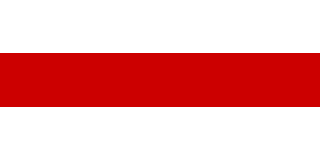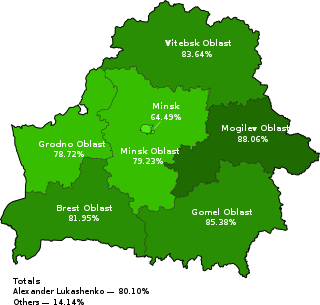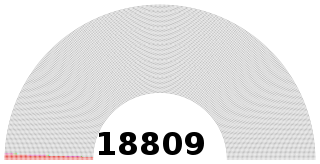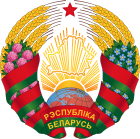
The politics of Belarus takes place in a framework of a presidential republic with a bicameral parliament. The President of Belarus is the head of state. Executive power is nominally exercised by the government, at its top sits a ceremonial prime minister, appointed directly by the President. Legislative power is de jure vested in the bicameral parliament, the National Assembly, however the president may enact decrees that are executed the same way as laws, for undisputed time.

The United Civic Party is a banned liberal-conservative and liberal political party in Belarus. The party opposes the government of Alexander Lukashenko and has participated in the country's elections on a few occasions, but it did not have a single member in the Belarusian parliament until one member was elected during the 2016 elections. It claims that its lack of seats is due to the unfairness of the election process.

Belarus elects on national level a head of state—the president—and a legislature. The president is elected for a five-year term by the people. The National Assembly has two chambers. The House of Representatives has 110 members elected in single-seat constituencies elected for a four-year term. The Council of the Republic has 64 members, 56 members indirectly elected and eight members appointed by the president.

Elections in Lithuania are held to select members of the parliament, the president, members of the municipal councils and mayors, as well as delegates to the European Parliament. Lithuanian citizens can also vote in mandatory or consultative referendums.

Presidential elections were held in Belarus on 19 March 2006. The result was a victory for incumbent, President Alexander Lukashenko, who received 84.4% of the vote. However, Western observers deemed the elections rigged. The Organization for Security and Co-operation in Europe (OSCE) declared that the election "failed to meet OSCE commitments for democratic elections". In contrast, election observers from the Commonwealth of Independent States (CIS) described the vote as open and transparent.

The House of Representatives of the National Assembly of the Republic of Belarus is the lower house of the parliament of Belarus, while the upper house is the Council of the Republic. It was established after the Constitution of Belarus was amended in 1996, replacing the Supreme Council of Belarus.

The Party of Freedom and Progress is a liberal political party in Belarus. Since 2003, it has continuously failed to reach the minimum threshold to get an official registration by the electoral commission.

Vladimir Novosiad is a Belarusian politician of liberal orientation, the leader of Belarusian Liberal Party of Freedom and Progress. He was born on April 12, 1968, in Kiev (Ukraine). Variants of his name include the following: Vladimir Novosyad, Uladzimir Navasiad, Uladzimir Navasyad,. Married and has two daughters.

The Belarusian opposition consists of groups and individuals in Belarus seeking to challenge, from 1988 to 1991, the authorities of Soviet Belarus, and since 1995, the leader of the country Alexander Lukashenko, whom supporters of the movement often consider to be a dictator. Supporters of the movement tend to call for a parliamentary democracy based on a Western model, with freedom of speech and political and religious pluralism.

Parliamentary elections were held in Belarus on 23 September 2012. At stake were the 110 seats in the House of Representatives, the lower house of the National Assembly of Belarus.

The Belarusian Patriotic Party was a political party in Belarus loyal to President Alexander Lukashenko. Nikolai Ulakhovich was the party's chairman.

Snap parliamentary elections were held in Ukraine on 26 October 2014 to elect members of the Verkhovna Rada. President Petro Poroshenko had pressed for early parliamentary elections since his victory in the presidential elections in May. The July breakup of the ruling coalition gave him the right to dissolve the parliament, so on 25 August 2014 he announced the early election.

Presidential elections were held in Belarus on 11 October 2015. Long-term president Alexander Lukashenko ran for his fifth term in office, having won every presidential election since independence in 1991. He was re-elected with 84% of the vote, according to official figures. The 'against all' option received more votes than any opposition candidate.

Parliamentary elections were held in Mongolia on 29 June 2016. The governing Democratic Party lost to a landslide victory of the Mongolian People's Party, retaining only nine of 76 seats in the Great Khural. Although the Democratic Party's vote share was down by just two percentage points, a new electoral law passed by the party while in government to promote two-party system, together MPP vote share rising by around 14 percentage points, saw the Democratic Party lose 25 of 34 seats. As a result, the MPP secured a supermajority with 65 of 76 seats.

Parliamentary elections were held in Belarus on 17 November 2019.

Presidential elections were held in Belarus on Sunday, 9 August 2020. Early voting began on 4 August and ran until 8 August.

Hanna Anatolyeuna Kanapatskaya or Anna Anatolyevna Kanopatskaya is a Belarusian politician, former MP, lawyer, entrepreneur and candidate in the 2020 Belarusian presidential election. She is also a former parliamentary deputy, represented the United Civic Party of Belarus from 1995 to 2019 and served as an MP from 2016 to 2019. She is known for her political campaign on calling Belarus to be freed from Russian interference.

Presidential elections were held in Belarus on 26 January 2025 under the terms of the constitution. The president is directly elected to serve a five-year term.

27th convocation local councils of Republic of Belarus elections were held on 23 March 2014. 1328 Local Deputy Councils were filled with 18,816 representatives. Moreover, at the same time elections of single deputy to House of Representatives of National Assembly were held in Gomel-Navabielicki 36 electoral district where government-favoured candidate was removed from elections just before 2012 parliamentary election, and the only candidate left did not receive enough support.
Parliamentary elections were held in Belarus on 25 February 2024. The country elected 110 deputies to the lower house of parliament and about 12,000 representatives of local councils.






















